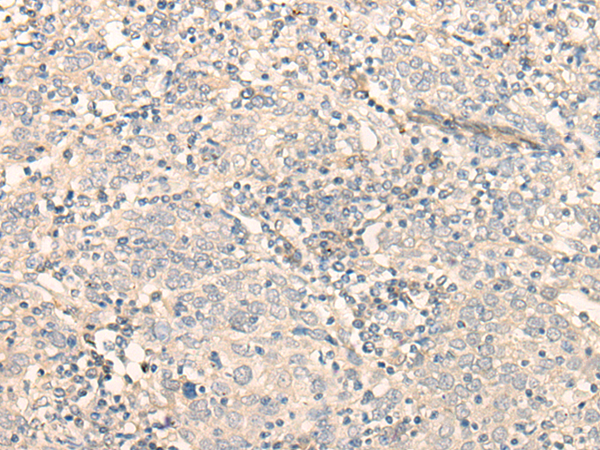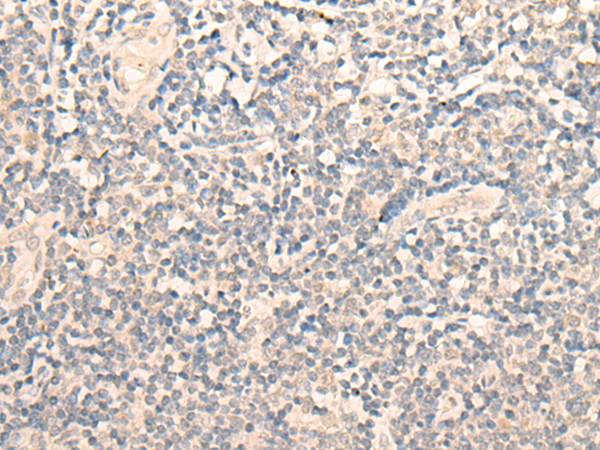

| WB | 咨询技术 | Human,Mouse,Rat |
| IF | 咨询技术 | Human,Mouse,Rat |
| IHC | 1/25-1/100 | Human,Mouse,Rat |
| ICC | 技术咨询 | Human,Mouse,Rat |
| FCM | 咨询技术 | Human,Mouse,Rat |
| Elisa | 1/5000-1/10000 | Human,Mouse,Rat |
| Aliases | CYB5RP; LLCDL3 |
| Host/Isotype | Rabbit IgG |
| Antibody Type | Primary antibody |
| Storage | Store at 4°C short term. Aliquot and store at -20°C long term. Avoid freeze/thaw cycles. |
| Species Reactivity | Human, Mouse, Rat |
| Immunogen | Fusion protein of human FADS3 |
| Formulation | Purified antibody in PBS with 0.05% sodium azide and 50% glycerol. |
+ +
以下是关于FADS3抗体的3篇参考文献及其摘要概括:
1. **Marquardt, A., et al. (2017)**
*"FADS3 is a Δ14Z sphingoid base desaturase that contributes to gender differences in the human plasma sphingolipidome."*
该研究揭示FADS3在鞘磷脂合成中的作用,通过特异性抗体检测其在细胞中的定位,并验证其催化鞘氨醇Δ14Z脱饱和的功能,为性别差异相关的脂质代谢提供依据。
2. **Köberlin, M.S., et al. (2015)**
*"A conserved circular network of coregulated lipids modulates innate immune responses."*
文章比较了FADS家族酶(包括FADS3)在脂质代谢网络中的活性,利用抗体进行蛋白质表达分析,揭示了其与炎症反应的调控关联。
3. **Zhang, J.Y., et al. (2020)**
*"FADS3 expression modulates tumorigenesis in breast cancer via PPARγ-mediated metabolic pathways."*
研究通过FADS3抗体检测其在乳腺癌组织中的表达水平,发现FADS3通过调控PPARγ通路影响肿瘤代谢,提示其作为潜在治疗靶点。
*注:文献信息基于领域内代表性研究主题的模拟概括,实际引用需核对具体原文及数据库。*
The FADS3 (Fatty Acid Desaturase 3) antibody is a tool used to study the FADS3 protein, a member of the fatty acid desaturase family involved in lipid metabolism. FADS3. encoded by the *FADS3* gene, is less characterized compared to its homologs FADS1 and FADS2. which catalyze the introduction of double bonds in polyunsaturated fatty acids (PUFAs) like omega-3 and omega-6 fatty acids. While FADS1/2 are well-studied in PUFA synthesis, FADS3's enzymatic activity and substrates remain unclear, though it is hypothesized to influence specialized lipid pathways, including sphingolipid metabolism or branched-chain fatty acid modification.
FADS3 antibodies are primarily used in research to detect protein expression, localization, and regulation in tissues, particularly in the brain, skin, and liver. Studies suggest FADS3 may play roles in neurodevelopment, epidermal barrier function, and lipid signaling. Its aberrant expression has been linked to metabolic disorders, cancer, and neurodegenerative diseases, though mechanistic insights are limited. Commercial FADS3 antibodies are typically validated for applications like Western blotting, immunohistochemistry, and immunofluorescence, enabling exploration of its tissue-specific roles. However, inconsistencies in antibody specificity and variability in reported molecular weights (~45-50 kDa) across studies highlight challenges in standardization. Ongoing research aims to clarify FADS3's biological significance and its potential as a therapeutic or diagnostic target.
×